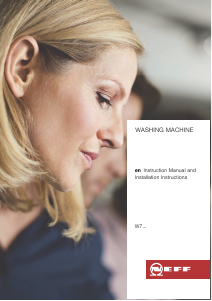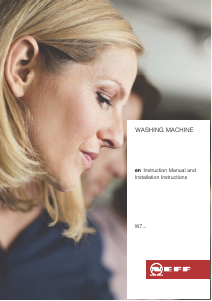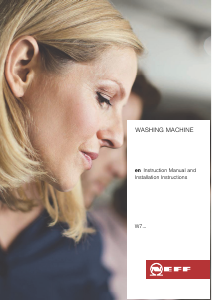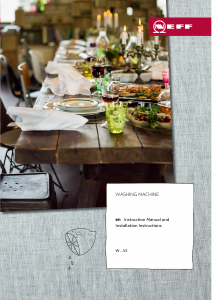
7
Overview of programmes aRefer to the table of consumption values on page 8, and advice and warnings on page 6.
Programmes °C max.
Type of laundry
Additional functions; Information
Cottons
: - 90 °C
7 kg/
4 kg*
hard-wearing fabrics, cottons or linen that can be washed
at 90°C
TurboPerfect
i*, EcoPerfect j, S(Reduced Ironing),
÷(Water plus)
+ Prewash
Sensitive : - 60 °C
colour fast cottons or linen
TurboPerfect i*, EcoPerfect j, S(Reduced Ironing),
÷(Water plus);
for particularly sensitive skin; longer wash programme at selected temperature,
higher water level, additional rinse cycle
Synthetics
: - 60 °C
3.5 kg
easy-care cotton, linen, synthetic or blended fabrics
TurboPerfect i, EcoPerfect j, S(Reduced Ironing),
÷(Water plus)
+ Prewash
Mix : - 40 °C
cotton or synthetic fabrics
TurboPerfect i, EcoPerfect j, S(Reduced Ironing),
÷(Water plus);
different types of laundry can be washed together
Synthetics+ : - 40 °C
dark cotton and dark synthetic fabrics
TurboPerfect i, EcoPerfect j, S(Reduced Ironing),
÷(Water plus);
reduced rinse and final spin cycle
Delicate/Silk : - 40 °C
2 kg
for delicate fabrics, e.g., silk, satin, synthetic fibres or
blended fabrics (e.g. curtains)
TurboPerfect i, EcoPerfect j, S(Reduced Ironing),
÷(Water plus):
no spin between rinse cycles
ÿ Wool : - 40 °C
hand/machine washable wool
particularly delicate wash programme to avoid shrinkage of laundry;
longer programme breaks (fabrics rest in the detergent solution)
Super Quick 15’ : - 40 °C
synthetic cotton, linen, synthetic fibres or blended fabrics
Short programme of approx. 15 minutes,
suitable for lightly soiled laundry
Sports : - 40 °C
microfibre fabrics
TurboPerfect i, EcoPerfect j, S(Reduced Ironing),
÷(Water plus)
Dessous : - 40 °C 1 kg
lingery
TurboPerfect i, EcoPerfect j, S(Reduced Ironing),
÷(Water plus)
Additional programmes Rinse / Spin , Empty, Gentle spin
* reduced load with additional function TurboPerfect i.
For programmes without prewash, add detergent to compartment II. For prewash programmes, distribute the detergent between compartments I and II.
9405 / 9001002518
9001002518
W7320F3EU /...
Neff GmbH
CarläWery Str. 34
81739 Munich / Germany
8
Safety instructions
– Carefully read the instruction manual and the information enclosed, and act accordingly.
– Keep the machine's documentation for future reference.
Risk of electric shock! – Never pull the cable to disconnect the mains plug!
– Never insert/disconnect the mains plug with damp hands.
Danger to life! For worn-out appliances:
– Disconnect the mains plug.
– Sever the mains cable and discard along with the plug.
– Destroy the lock on the washing machine door. This will prevent children from
locking themselves in and risking their lives.
Danger of suffocation! – Keep packaging, film and packaging parts out of the reach of children.
Risk of poisoning! – Keep detergents and care products out of the reach of children.
Risk of explosion! – Items of laundry pretreated with cleaning agents containing solvents, e.g. stain
remover/cleaning solvent may lead to an explosion after being loaded into the
washing machine.
Rinse items of laundry thoroughly by hand beforehand.
Risk of injury! – The washing machine door may become very hot.
– Be careful when draining hot detergent solution.
– Do not climb onto the washing machine.
– Do not lean on the open washing machine door.
– Do not reach into the drum if it is still rotating.
– Be careful when opening the detergent drawer while the machine is in operation.
Consumption values depending on model
Programme Load
Electricity
***
Programme
duration
***
Water inlet temperature
Water***
cold 60 °C
Cottons 20 °C 7 kg 0.35 kWh 0.35 kWh 66 l 2 ½ h
Cottons 30 °C 7 kg 0.41 kWh 0.41 kWh 66 l 2 ½ h
Cottons40 °C* 7 kg 1.02 kWh 0.48 kWh 66 l 2 B h
Cottons60 °C 7 kg 1.24 kWh 0.58 kWh 66 l 2 B h
Cottons90 °C 7 kg 2.16 kWh 1.37 kWh 76 l 2 B h
Synthetics 40 °C* 3.5 kg 0.64 kWh 0.37 kWh 55 l 1 B h
Mix 40 °C 3.5 kg 0.54 kWh 0.32 kWh 47 l 1 h
Delicate/Silk 30 °C 2 kg 0.19 kWh 0.19 kWh 34 l B h
Wool 30 °C 2 kg 0.17 kWh 0.17 kWh 39 l B h
* Programme setting for testing in accordance with valid standard EN60456.
Note on comparative tests: For testing the test programmes, wash the specified load using the maximum spin speed.
Programme
Additional
function
Load
Annual energy
consumption
Annual water
consumption
Cottons40/60 °C EcoPerfect j** 7/3.5 kg 174 kWh 8140 l
** Programme setting for testing and energy labelling in accordance with EU directive 2010/30/EU with cold water (15 ºC).
*** The values deviate from the indicated values depending on water pressure, hardness, and inlet temperature, ambient tem-
perature, type, amount and soiling of the laundry, detergent used, fluctuations in the power supply and selected additional
functions.
9
Care and cleaning
Before the first wash
Do not put laundry in the machine! Turn on the tap. Put into compartment II:
– approx. 2 litres of water
– detergent (measure according to the manufacturer's instructions for lightly soiled laundry and water hardness)
Turn the programme selector to Synthetics 60 °C and press
Start/Reload. At the end of the programme, turn the programme
selector to
Off.
Machine housing, control panel
– Remove detergent and cleaning agent residue.
– Wipe with a soft, damp cloth.
– Do not wash the machine with a jet of water!
Cleaning the detergent drawer ...
... if it contains detergent or fabric softener residues.
1.
Pull out, press insert down and remove drawer completely.
2. To remove the insert: press upwards from below with your finger.
3. For models with insert for liquid detergent:Slide the insert upwards and remove it from the back.
4. Clean the detergent dispenser tray and inserts with water and a brush and dry them.
5. Attach the insert and engage (connect the cylinder to the guide pin).
6. Push in the detergent drawer.
Leave the detergent drawer open so that any residual water can evaporate.
Drum
Leave the washing machine door open so that the drum can dry out.
For rust stains, use chlorine-free cleaning agent, not steel wool.
Descaling Ensure there is no laundry in the machine!
This will not be necessary if the correct dosage of detergent is used. If it is, descale the appliance according to the
manufacturer's instructions. Descaling products can be acquired on the website or from customer services aInstallation
instructions.
Emergency release (e.g. in the event of a power cut)
The programme continues to run when the power has been restored. However, if the laundry has to be removed, the
washing machine door can be opened as follows:
Risk of scalding!
The detergent solution and laundry may be hot. Let it cool.
Do not reach into the drum if it is still rotating.
Do not open the washing machine door if water can be seen through the glass.
1.
Turn the programme selector to Off and disconnect the mains plug.
2. Drain the detergent solution apage 10.
3. Pull the emergency release downwards with a tool and release.
The washing machine door can then be opened.
Information on the display panel depending on model
flashes Close the washing machine door properly; laundry may be caught.
§: ³Å,
§: É
Turn on the (cold water) tap fully, supply hose kinked or trapped;
Clean the filter apage 10, water pressure too low.
§: ³µ– Detergent solution pump blocked; Clean the detergent solution pump apage 10.
– Drainage hose / waste pipe blocked; Clean the drainage hose at the siphon apage 10.
– Heavy foam build-up apage 11, status indicator 1 flashes.
§: ´Water in the base tub, appliance leaking. Call customer services!
©: ³¯– Open the (hot water) tap fully.
– Inlet hose kinked/trapped.
– Water pressure too low. Clean the filter apage 10.
– Hot water hose not connected; appliance will operate using cold water only. Ignore information, only for first
wash cycle.
)Childproof lock activated: to deactivate a page 5.
– Risk of electric shock! Disconnect the mains plug.
– Risk of explosion! Do not use solvents.
9
10
Maintenance
Detergent solution pump
Turn the programme selector to Off and disconnect the mains plug.
1. Using a screwdriver or the insert for liquid detergent
(depending on model), open and remove the service flap.
2. Remove the folding gutter and place a large enough container underneath.
3. For models with a drainage hose: Remove the drainage hose from the retainer and pull it
from the housing.
Remove the sealing cap, allow the detergent solution to flow out into the container. Replace
the sealing cap and place the drainage hose in the retainer.
3* For models without a drainage hose: Carefully unscrew the pump cover 180° or until the
detergent solution begins to flow out on the folding gutter. When the container is full, close
the pump cover and empty the container. Repeat the above steps until all the detergent
solution has completely drained out.
4. Carefully unscrew the pump cover (there may be residual water).
5. Clean the interior, pump cover thread and pump housing (the impeller in the detergent
solution pump must rotate).
6. Replace the pump cover and screw it tightly.
7. Return the drainage hose (depending on model) and the folding gutter to their start position.
8. Place the service flap back on and close.
To prevent unused detergent from flowing straight into the drain during the next wash:
Pour 2 litres of water into compartment II and then start theEmpty programme.
Drainage hose at the siphon
Turn the programme selector to Off and disconnect the mains plug.
1. Loosen the hose clamp, carefully remove the drainage hose (residual water).
2. Clean the drainage hose and siphon connecting piece.
3. Reattach the drainage hose and secure the connection with the hose clamp.
Filter in the water supply
Risk of electric shock!
Do not immerse the Aqua-Stop safety device in water (contains an electric valve).
Reduce the water pressure in the supply hose:
1. Turn off the tap.
2. Select any programme (except Rinse / Spin // Empty).
3. Choose Start/Reload. Let the programme run for approximately 40 seconds.
4. Turn the programme selector to Off. Disconnect the mains plug.
Clean the filter:
5. Disconnect the hose from the tap.
Clean the filter using a small brush.
and/or for Standard and Aqua-Secure models:
Remove the hose on the rear of the appliance.
Remove the filter with pliers and clean.
6. Connect the hose and check for leaks.
– Risk of burning!
Allow the detergent solution to cool.
– Turn off the tap.
11
What to do if...
ʑ
Water is leaking out – Attach/replace the drainage hose correctly.
– Tighten the screw connection of the supply hose.
ʑ
No water supply.
Detergent not dispensed.
– Start/Reload not selected?
– Tap not turned on?
– Filter blocked? Clean the filter apage 10.
– Supply hose kinked or trapped?
ʑ
The appliance door will not
open.
– Safety function active. Programme stopped? apage 4.
– (without final spin) selected? apage 3, 4.
– Can be opened by emergency release only? apage 9.
– Door locked after the washing machine is switched off: Switch on the washing
machine and wait for 5 seconds.
ʑ
The selected programme does
not start.
– Start/Reload or (Ready in) time selected?
– Washing machine door closed?
– Childproof lock active? Deactivate apage 5.
ʑ
Detergent solution is not
drained.
– (without final spin) selected? apage 3, 4.
– Clean the detergent solution pump apage 10.
– Clean the waste pipe and/or drainage hose.
ʑ
No water can be seen in the
drum.
– Not a fault. Water remains inside below the visible area.
ʑ
Spin result not satisfactory.
Laundry wet/too damp.
– Not a fault. Spin control system has stopped the spin cycle. Uneven distribution of
laundry.
Distribute large and small items of laundry evenly in the drum.
– S(Reduced Ironing) selected? apage 5.
– Selected speed too low? apage 5.
ʑ
Programme duration changes
suddenly during operation.
– Not a fault. The program time can vary according to the distribution of laundry, with
it therefore being possible for the display panel to show adjustments in the
duration.
ʑ
Spin cycle performed several
times.
– Not a fault. The balance control system has detected an imbalance and is
attempting to redress this by repeating the spin.
ʑ
Residual water in the
compartment for care products.
– Not a fault: the action of the care product is not affected.
– Clean the compartment if necessary apage 9.
ʑ
Odour formation in the washing
machine.
– Run programme Cottons90 °C without laundry. Use standard detergent.
ʑ
Status display 1 flashing.
Appliance has detected a
detergent overload.
– Too much detergent used?
If foam is escaping from the detergent drawer: mix 1 tablespoon of fabric softener
with ½ litre of water and pour into compartment II (not with outdoor or down
fabrics).
– Reduce the detergent dosage for the next wash cycle.
ʑ
Intense noise formation,
vibrations and "wandering"
during the spin cycle.
– Are the appliance feet fixed?
Secure the appliance feet aInstallation instructions.
– Transportation safety devices removed?
Remove transportation safety devices aInstallation instructions.
ʑ
Display panel/indicator lamps
remain turned off while the
machine is working.
– Energy-saving mode apage 5.
– Power cut?
– Fuses triggered? Reset/change the fuse.
– If the fault occurs repeatedly, call customer services.
ʑ
Programme sequence longer
than usual.
– Not a fault. Unbalanced load detection system adjusts imbalance by repeatedly
distributing the laundry.
– Not a fault: foam detection system active; adds an additional rinse cycle.
ʑ
Detergent residues on the
laundry.
– Occasionally, phosphate-free detergents contain water-insoluble residues.
– Select Rinse / Spin or brush out the laundry after washing.
If you cannot correct a fault yourself or if a repair is necessary:
– Turn the programme selector to Off and remove the mains plug from the socket.
– Turn off the water supply and call customer services aInstallation instructions.
n
WASHING
MACHINE
en Instruction manual












Praat mee over dit product
Laat hier weten wat jij vindt van de Neff W7320F3EU Wasmachine. Als je een vraag hebt, lees dan eerst zorgvuldig de handleiding door. Een handleiding aanvragen kan via ons contactformulier.